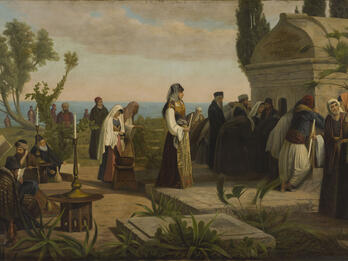Kuntres ahavat David (Treatise: The Love of David)
Says the Author:
O my God! Remember for good my most honorable Master, my father, my teacher in respect of the Divine precepts—may his memory be for a blessing for the life of the World-to-Come! I recall that when I was a little boy riding on my father’s shoulders, he implanted in my heart a love for the Torah and for those who study it, and he reared me in faith in, and practice of, delightful things, separating me from those who go astray; and he related tales to me about that dog, Shabetai Tsevi—may his bones rot—who exchanged his God for another and permitted things that are prohibited. As for anyone who believes in his “traditions,” such a person’s innermost designs are not of a godly nature. All his deeds were deceitful—both he and all his disciples wicked dogs, an assembly of evil-doers. They say, in relation to this carcass, that he is now hidden and concealed, and that he will shortly reveal himself and that his naked self will become visible in the sight of all; and they pervert the words of the Living God and the King of the Universe; they destroy the walls that are exalted and lofty—and they treat with disdain those observing the Fast Days with their vanities and dreams. [ . . . ]
Now I know that just as they turned to insanity in regard to the current year [the year 5560; equivalent to 1799–1800] with allusions, secrets, and perversions, there will yet be further occasions and seasons when they will proclaim: “The years predicted by prophecy for the advent of the Messiah have arrived”—and they will adduce signs and set up signposts culled from the mystic lore of the wise and the discerning, such as in connection with the year 5600—may it come to us for good! They will discover an allusion to it in the Zohar, and this is what they will say: “In the sixth hundredth year of the sixth millennium, the fountains of wisdom will be opened,” etc.
[ . . . ] In a generation which breaches all moral boundaries, and residing outside the Land of Israel, where—on account of our many sins—by reason of the study of the wisdom contained in the mystic tradition, much damage and numerous acts of desecration have occurred—in that the Almighty’s great Name has been profaned among the gentile nations, who do not know Him, and among the kingdoms who do not call upon His Name. O Hebrew nation, look around, that you may see!—have regard to the era of that wicked one, that man of excessively bold countenance, Shabetai Tsevi—may his bones rot! All those nations who heard of his apostasy rejoiced; we became a reproach and an object of mockery to our neighbors; as in the days of a solemn assembly, our terrors totally encompassed us; we became a byword in the mouth of the nations, suffering scorn from all sides; and the subsequent impostor made his iniquity still heavier and wrought evil to this people—that is to say, the abominable and abhorrent Jacob [Frank], that accursed man, who blasphemed the Almighty with the names of the Ba‘alim [the ancient Canaanite deities] and the vain idols; he it was who originally emerged all ruddy, his apparel being red; and his evil companions likewise were from this very same reddish hue. He rode upon a red horse, and his servants after him upon red horses, all of them bearing a reddish appearance; and everything that they wrote was inscribed with a reddish dye. And he compiled a religious law for them, which was neither the law of the Hebrews nor the law of the Christians—neither of Israel nor of Ishmael, nor in accordance with the laws of Persia and Media. Their laws were distinct from those of all who were acquainted with law and judgment; and he gave to his law the title: “The Law of Edom.” On the surface it was that of Edom, but inwardly, this modern-day Laban sought the teraphim and the idols, and adopted all abominations that had appeared in the land—swearing, and lying, and stealing, and committing adultery, breaking all bounds; raising questions concerning, and expounding, the verses of the Torah and the Prophets and the words of the Midrash in ways agreeable to their religious law and their views; they invented meanings, in consonance with their erroneous faith, in regard to diverse matters, which were contrary to reason—and they would not accept normal human logic. The anointed of the Lord was “taken captive” by their speech—namely, the dialogues of demons and the dialogues of ensnarement, of folly and madness. They bored through and strung together all the prophecies of the Prophets and Seers, and all allusions emanating from the savants of the secret lore, concerning the anointed of the Almighty to their own Messiah, who was “anointed” with the fatty tail of a sacrificial animal, and with impure fat!
Credits
Published in: The Posen Library of Jewish Culture and Civilization, vol. 6.




